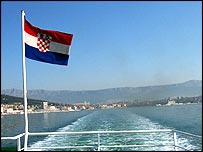King Willow's Adriatic conquest
By Alex Kirby
BBC News Online environment correspondent

The Adriatic tourist trade is picking up again
You might not suppose a small island in the central Adriatic would have had much to do with Britain. I didn't, and I kept finding out how wrong I was.
Vis, nearly thirty miles south of Split off the coast of Dalmatia, has had an interesting half century. It was where Tito made his headquarters in World War II: soon afterwards, he seized control of Yugoslavia, which he ruled autocratically until his death in 1980.
From his assumption of power almost until Croatia became independent in 1991, Vis was out of bounds to most Yugoslavs, a military reserve with an isolated civilian population.
Today, apart from a litter of deserted barracks and abandoned tunnels, Vis is doing quite well out of its long quarantine.
Those people who stayed are fairly cheerful, though there are few jobs, most of them in fishing. But many have decamped to the mainland or headed abroad.
Lotus eaters
Birds and marine life survive in greater numbers than on many more accessible islands, and there is no sign yet of pell-mell tourist development, though everyone recognises the potential for it.
Every prospect pleases on Vis - for now
At the moment, Vis is still laid-back and heedless of time. Zoran, a former journalist, invited me on a half-hour walk to an abandoned village. We reached it after 90 minutes, sat by someone's fireside for several hours, and stumbled home down a rocky path by moonlight, too late for dinner, though Zoran didn't mind.
People press you to try the pilchard pie which is one of the local staples, or the island's wine, too good to reach the mainland.
A walk along a scrub-covered hillside betrays no sound or scent of traffic, but leaves you heady with the aromas of rosemary and sage. Before long, all that may change. And if the steady trickle of tourists turns into a deluge heading for sun and fun, those from Britain need not feel homesick.
My first surprise was the Fortress of King George, guarding a headland above the harbour of the island's main town. It was built in 1812, during the four years when Vis was a British possession.
Still remembered
If you doubt its origin, look at the stone slab above the main gateway: a carved Union flag, and a tribute to George III.
Vis can prove it once was British
There is an echo of that across the other side of the harbour, in the British military cemetery behind St George's Church.
The oldest memorial there commemorates 11 sailors from the British battleship Victorious, who died of their wounds in 1812 after engaging with a French man-of-war near the coast of Venice.
The most recent tablet on the cemetery's walls, placed there in 1999, reads simply: "In memory of the British forces who from this island of Vis gave their lives in comradeship, supporting Tito's army of liberation..."
A couple of miles above the town, on a broad and gently sloping plateau, there are two parallel lines of concrete posts, marking out the limits of a runway.
Olives grow now on the land between the posts, but a nearby stone still carries a dedication to the men of the RAF who died over Croatia in the second world war.
More recent conflicts may have blurred memories of the old bitterness. But in one respect, Vis has decided to hark back to the brief spell when it was a truly British island - it has formed a cricket club.
More accurately, it has revived the club which played here nearly two centuries ago, in Britain's Adriatic heyday.
French victors
The club's rebirth is the work of a Croat, Oliver Roki: he learnt to love the game from his father, who lived in Australia.
It has been going two years, and has 20 adults and 50 younger members.
Oliver's claims to distinction on the pitch are varied. He was the only person on the island who knew the rules of the game when he first suggested the club - and in its inaugural match, he boasts of having scored the first duck on Vis in 200 years.
He is convinced that cricket is catching on in Croatia, though local opponents remain scarce - a club in Zagreb, and another just begun in a small town near the capital.
But there have been visits by teams from France and a pub in Cambridge. Vis lost to both of them, but still pulled in 200 spectators, Oliver says, none of whom understood the first thing they were watching.
This summer, the islanders are looking forward to a visit by a Royal Navy side, and hoping for a game with their Ionian neighbours on Corfu, where cricket is a much older tradition.
Suckers for sustenance
There is already a thriving trade in selling properties on Vis to foreign buyers. One British couple were so entranced with the house the agent showed them that they bought it on the spot, unfazed that the sale was taking place late at night and they had yet to see the property in daylight.
The cricket club may soon have an infusion of new blood, and the hillsides and beaches which few outsiders have seen for more than 60 years will begin to fill up. Some signs of a new and more popular phase in the island's life are there already.
One Vis restaurant has a Dalmatian novelty on offer - an octopus-burger. There are even chips to go with it. I'm not sure I can see it catching on, though.
From Our Own Correspondent was broadcast on Saturday, 22 May, 2004 at 1130 BST on BBC Radio 4. Please check the programme schedules for World Service transmission times.
http://news.bbc.co.uk/2/hi/programmes/from_our_own_correspondent/3737101.stm